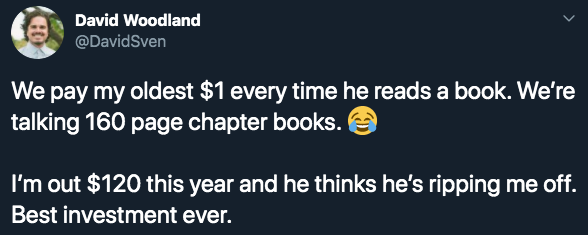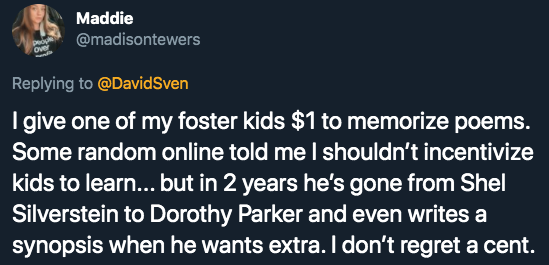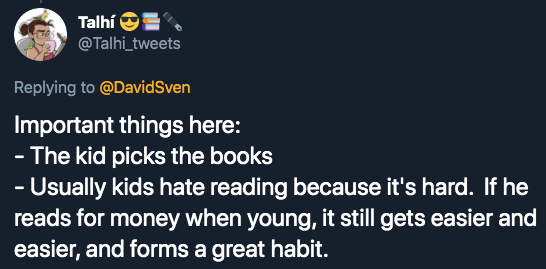Dad Sparks Parenting Debate With Viral Tweet About Paying Son to Read Books
Updated July 23 2020, 3:30 p.m. ET
David Woodland didn't think he'd start a viral Twitter controversy when he tweeted about paying his oldest son $1 for every book he reads. But oh boy, he did.
David's tweet about his increasingly costly parenting technique had nearly 500,000 likes and over 44,000 retweets. Thousands of commenters have replied either in support of David's tactic or criticizing him for making the incentive to read about earning money instead of about doing it for the love of reading.
This seems like a good thing, right? He incentivized his kid to read by offering him $1 for each one (a seemingly small amount of money), but now this kid is starting to read his parents out of house and home! That's awesome!
But lots of people in the responses didn't think so. Many believe that offering a monetary reward for something like reading takes all the interest out of the activity itself and puts the focus solely on making money.
"Be careful attaching financial incentive to something you want to be done out of intrinsic motivation — when the incentive disappears, the behavior is likely to as well," one person warns. Many claimed that what David is doing "kills the joy of learning" and makes it transactional, removing any intrinsic motivation to, in this case, read books.
As someone who grew up always loving to read, my parents didn't have to coax me with financial incentives. But I'd be lying if I said I wasn't motivated to read more by those classroom reading competitions and the possibility of winning a pizza party or something. Incentives can work to encourage kids who already love the activity and those who don't. What's bad about that?
While lots of people criticized David's actions, just as many praised them for making his son clearly fall in love with reading. He's read 120 books so far this year! A kid who absolutely hates reading wouldn't read that many books for the relatively small reward of $1 each.
"The kid is paid only $1 to read a book," one person wrote. "The incentive isn't as high as the effort and still the kid has continued doing it. The kid loves reading now. The incentive was to get him started/make him faster. Worth it."
Sometimes kids need a little external motivation to get going if the idea of the activity or assignment itself isn't exciting to them. They might struggle to understand how something like reading could benefit them when they haven't had good experiences in the past. An incentive like David's can inspire them to start making an effort. If it's done right, it can work to open kids up to experiences they were closed off to before.
One Twitter user, a doctor, responded, "I'm a clinical child psychologist and this is a great tactic. The best thing for reading is reading, and once you're used to reading, it becomes a habit. Don't worry about intrinsic motivation — books are their own motivators. Anyone who says otherwise doesn't understand learning."
In an interview with Bored Panda, David explains, "Some think that if you reward some tasks, those tasks become chores that a kid will never be able to enjoy. It’s a fair take. In the instance of my son, I don’t worry about his pleasure of reading. He is bright and his vocabulary is exploding.
"He sometimes shocks me with how smart and insightful he is. He has even mentioned we don’t have to pay him anymore, but we do anyway because it’s just a dollar. He doesn’t get an allowance, so outside of chores, this is possibly the only other way he can earn money on his own as an 8-year-old. He likes to save his money and is proud of the pile of money he has accumulated."



